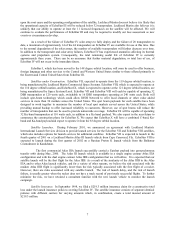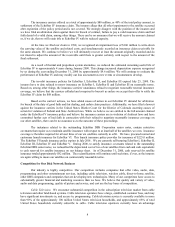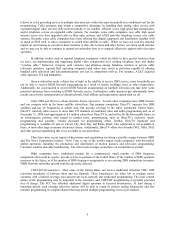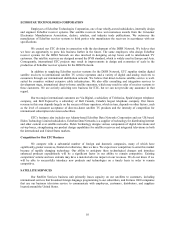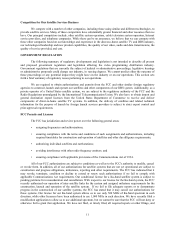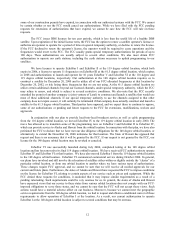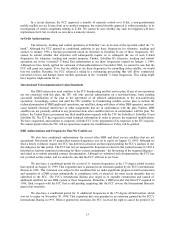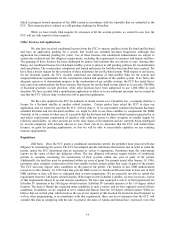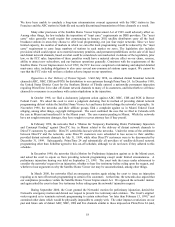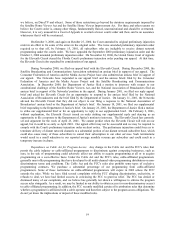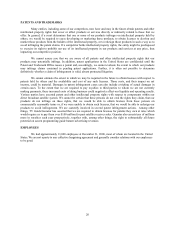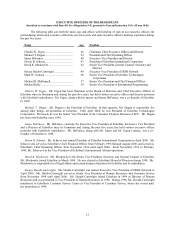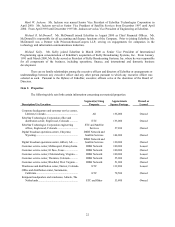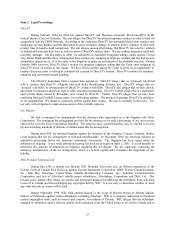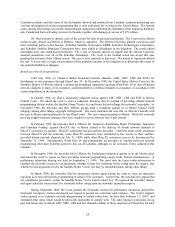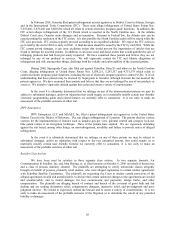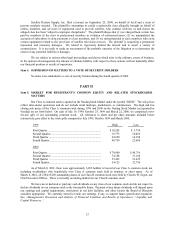Dish Network 2000 Annual Report Download - page 19
Download and view the complete annual report
Please find page 19 of the 2000 Dish Network annual report below. You can navigate through the pages in the report by either clicking on the pages listed below, or by using the keyword search tool below to find specific information within the annual report.17
Home Viewer Improvement Act enacted in November 1999, instructed the FCC to establish a predictive model
based on the model it had endorsed in February 1999, and also directed the FCC to ensure that its predictive model
takes account of terrain, building structures and other land cover variations. The FCC recently issued a report and
order that does not adjust the model to reflect such variations for any VHF stations. Failure to account for these
variations could hamper our ability to retransmit distant network and superstation signals.
The Satellite Home Viewer Improvement Act of 1999 has also established a process whereby consumers
predicted to be served by a local station may request that this station waive the unserved household limitation so that
the requesting consumer may receive distant signals by satellite. If the waiver request is denied, the Satellite Home
Viewer Improvement Act of 1999 entitles the consumer to request an actual test, with the cost to be borne by either
us or the broadcast station depending on the results. The testing process required by the statute can be very costly
for us. The FCC staff has informally raised questions about how we implement that process. We can provide no
assurance that the FCC will not find that our implementation of the process is not in compliance with these rules.
Furthermore, the FCC has recently identified a third party organization to examine and propose tester qualification
and other standards for testing. We cannot be sure that this decision will not have an adverse effect on our ability to
test whether a consumer is eligible for distant signals.
In addition, the Satellite Home Viewer Improvement Act of 1999 could adversely affect us in several other
respects. The legislation prohibits us from carrying more than two distant signals for each broadcasting network and
leaves the FCC’s Grade B intensity standard unchanged without future legislation. The FCC recently released a
report recommending that only minor changes be made to the Grade B standard, a recommendation that is
unfavorable to us. While the Satellite Home Viewer Improvement Act of 1999 reduces the royalty rate that we
currently pay for superstation and distant network signals, it directs the FCC to require us (within one year from
November 29, 1999) to delete substantial programming (including sports programming) from these signals. The
FCC has recently released rules implementing that directive, which have become effective. These requirements may
significantly hamper our ability to retransmit distant network and superstation signals, or may impose burdens upon
us that are so onerous that we may be required to substantially alter, or stop retransmitting, many or all superstation
signals. In addition, the FCC’s sports blackout requirements, which apply to all distant network signals, are very
cumbersome and may require costly upgrades to our system.
For existing customers the new legislation also permits hundreds of thousands of consumers to continue to
receive distant network channels who would otherwise be required to be disconnected. The new law generally does
not, however, permit consumers predicted to receive a signal of “Grade A” intensity to continue receiving distant
network channels. As a result, we believe hundreds of thousands of consumers have or could lose access to network
channels by satellite. In anticipation of passage of the legislation, and for other reasons, we recently ceased
providing distant network channels to tens of thousands of customers. These turn offs, together with others, could
result in a temporary material increase in churn and a small reduction in revenue per subscriber. Further,
broadcasters could seek a permanent injunction on our sales of both distant and local network channels, which
would have a material adverse effect on our churn, revenue, ability to attract new subscribers, and our business
operations generally.
The Satellite Home Viewer Improvement Act of 1999 generally gives satellite companies a statutory
copyright license to retransmit local-into-local network programming, subject to obtaining the retransmission
consent of the local network station. Retransmission consent agreements are important to us because a failure to
reach such agreements with broadcasters could have an adverse effect on our strategy to compete with cable and
other satellite companies, which provide local signals. The Satellite Home Viewer Improvement Act of 1999
requires broadcasters to negotiate retransmission consent agreements in good faith. In accordance with the
requirements of the Satellite Home Viewer Improvement Act of 1999, the FCC has promulgated rules governing
broadcasters’ good faith negotiation obligation. These rules allow satellite providers to file complaints with the FCC
against broadcasters for violating the duty to negotiate retransmission consent agreements in good faith. Currently,
the degree to which the rules will be of practical benefit to us in our efforts to obtain all necessary retransmission
consent agreements remain unclear. While we have been able to reach retransmission consent agreements with most
of the local network stations we currently carry, our planned roll-out of local channels in more cities will require
additional agreements, and we cannot be sure that we will secure these agreements or that we will secure new
agreements upon the expiration of our current retransmission consent agreements, some of which are short term.


